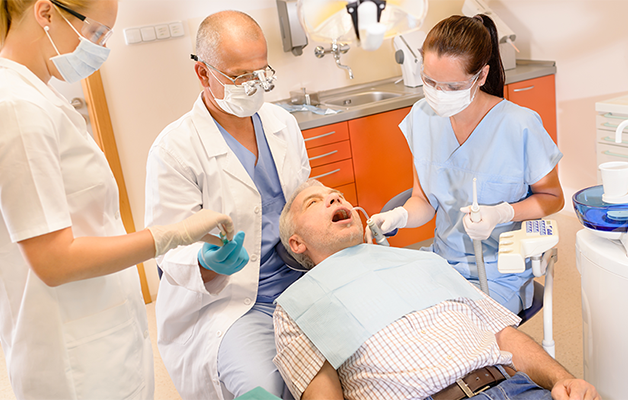
If you’re over 65 years of age, you’re likely aware of or familiar with common health issues related to aging. In fact, according to the National Council on Aging approximately 92% of older adults have at least one chronic disease, and 77% have at least two. That’s why it’s so important to focus on preventative care to take proper action to maintain and improve your health. While the list of potential healthcare mistakes could fill an entire book, this article will focus on a few core dental care mistakes most seniors can avoid for better oral health:
Assuming tooth loss and dentures are unavoidable
Many seniors are under the false impression that, as we age, we’re all destined to lose our teeth and eventually rely on dentures. If this scenerio is believed to be inevitable, it makes sense that there is no urgency in trying to avoid it.
The facts, however, don’t support this belief. With today’s available home oral health care products and the relatively easy access to quality professional dental care, there’s no prevailing reason why we shouldn’t expect to maintain most or all our natural teeth throughout our entire life.
Tooth loss is caused by poor oral health and/or trauma. If you take necessary safety precautions to avoid facial injuries and care effectively for your oral health, in most cases, you should be able to avoid needing dentures.
Ignoring dry mouth
Dry mouth, also known as xerostomia, is a condition that becomes very common as we age. Just as it sounds, dry mouth is characterized by a lack of adequate saliva in the mouth which causes the tongue, the gums, and other soft tissue in the mouth to get dehydrated and sticky.
"Many seniors are under the false impression that, as we age, we’re all destined to lose our teeth and eventually rely on dentures. If this scenerio is believed to be inevitable, it makes sense that there is no urgency in trying to avoid it."
It’s especially common in seniors because it is a very common side effect of many different prescription medications. In general, the older we get, the more medications we may need to take, and so dry mouth comes along for the ride.
It’s little more than an annoyance when it first appears, so it may be ignored. That’s dangerous, though, because saliva plays a vital role in digestion as well as in cleaning and sanitizing your teeth and gums. Without adequate saliva, we become far more susceptible to a number of oral health conditions including tooth decay and gum diseases.
While there are prescription medications and medicated mouthwashes that can be used to treat xerostomia, it can usually be effectively controlled by consciously remaining hydrated by sipping on water throughout the day. Chewing sugarless gum can also help as the act of chewing encourages saliva production.
Deprioritizing regular dental care

When juggling doctor’s appointments, it can be tempting to cancel the ones that seem least important to save the time and hassle.
If you’re not currently experiencing acute tooth pain or some other troublesome symptom related to oral health, it’s easy to deprioritize a semiannual professional cleaning and dental exam. Doing so can be dangerous, however, since it removes the opportunity to get a thorough and effective cleaning, and it’s generally at these examinations that early symptoms of oral health (and other systemic health) conditions are identified, allowing for earlier treatment.
Deciding dental care is too expensive
This and the assumptions above often go hand-in-hand, especially for seniors living on a tight or fixed budget. Considering the high volume of medical expenses seniors face, combined with the fact that many seniors on Medicare do not have dental coverage, paying out of pocket for dental services often becomes the norm.
When there isn’t a specific problem or chronic pain that requires the services of a dentist, it’s easy to look at the cost of preventive dentistry and decide it’s just not worth the price.
However, as noted above, both preventive care and more advanced dental procedures have a bearing on both oral health and our overall systemic health. So, ignoring preventive dental care can have a detrimental effect on the whole body. And at a time when medical concerns are more likely, it’s important to take action to focus on prevention and early diagnosis.
If the cost of senior dental care is causing you or a loved one to make some of these avoidable oral health mistakes, consider joining a discount dental plan to ease the burden. With 20% to 50% off the normal retail cost of dental services, they can be properly prioritized and more easily fit into a tight budget.

